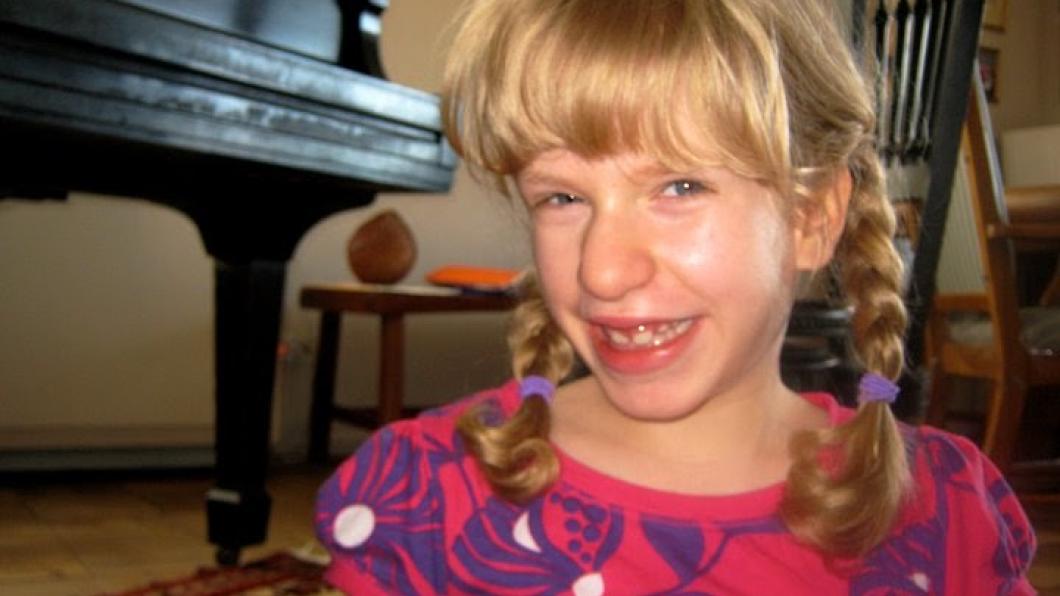
A jazz legend's 'perfect kid' inspires Disability Pride NYC
By Louise Kinross
When Mike LeDonne’s daughter Mary (above) was born, the mood in the room went from jubilation over what doctors said was a “textbook birth” to silence when the baby didn’t cry and was whisked away.
Three weeks later Mike and his wife Margaret learned Mary had Prader-Willi syndrome. The geneticist sent his assistant—“a new, young girl who’s all sparkly and happy with a smile on her face because she’s doing her job,” Mike says. “She tells us Mary will be morbidly obese, severely retarded and have bad behaviour problems. We came out of there white as ghosts and went home and lay on the bed and cried for two hours.”
Oddly “when we were around Mary, holding her, we felt great. She’s fantastic, she’s beautiful, we’d say. We felt better just looking at her.” But then the doctors were back with their “cold-blooded medical perspective, where they don’t see any humanity and this will be terrible.” Because Prader-Willi can be associated with chronic hunger, “you’re going to have to lock all your cabinets and she’s going to be eating your garbage,” the couple was told.
Ironically, Mary, now 10, never developed the insatiable hunger often seen in the syndrome. She doesn’t talk or see much and needs a wheelchair for long distances. But “she plays the piano for hours, improvising and creating themes she develops very purposefully,” Mike says.
This is handy given that Mike is an acclaimed jazz pianist who works from his New York apartment. “She’s the perfect kid for me. Music is her world and I’m a musician, so it really worked out good for me. She loves hearing me practice.”
One day, listening to Mary and her school peers—many of whom are blind and developmentally disabled—sing at a ceremony “it made me think we need something to celebrate these kids. I want to break down that wall of ‘oh no, they’re all in hospitals and institutionalized and weird.’ They’re just people, and they do what you do.”
So he organized the Disability Pride NYC parade, an annual march that kicks off this July 12.
“It’s going to be thousands of disabled people of all ages and races and every kind of human being on the planet. We’ll show up at Madison Square Park in Manhattan and then carry banners or roll in wheelchairs down Broadway to Union Square Park where we’ll have a stage set up and disabled performers and food and kiosks with literature from disability organizations. I wanted it outside so that able-bodied people will wander in and see people having a great time and say ‘I didn’t know disabled people were like this.’”
The Mayor’s Office for People with Disabilities has jumped onboard as a partner and tonight Mike and a number of jazz legends he calls friends are playing a concert as a fundraiser at the Quaker Friends Meeting Hall.
Mike says the greatest challenge raising Mary has been dealing with the perception—among medical folks and at large—that Mary is a tragedy. “It’s going out in public and having children stare at her like she’s a two-headed freak,” he says. “And the ignorance of the parents who never say anything to their kids and let them do it. And the way people pity me for having a child like Mary. I’m happy and in love with my daughter. She’s the light of our lives.”
Mike says he sent a parade flyer to parents of 300 children at his daughter’s school and was surprised when only three responded. “I wasn’t expecting that kind of indifference from the parents. A lot of these parents, they love their kid, but they’re not proud of their kid. I want to change that.
“I call it the Brady Bunch syndrome. People have this ideal of the American dream with four kids and the dog and the house with a picket fence and two cars and a husband who works and then the disabled kid comes in and screws it all up.” He notices some parents put a lot of energy into trying to get their disabled child to “assimilate and pass” as non-disabled.
Mike says Mary has been a huge influence on his music. “When you have a child who is non-verbal, you learn to communicate on a level that takes a deeper understanding and human connection. I think because of Mary I grew as a person, my music grew, plus I’ve written music inspired by her. But mainly it’s the growth as a human being that I’ve had, all thanks to her.”